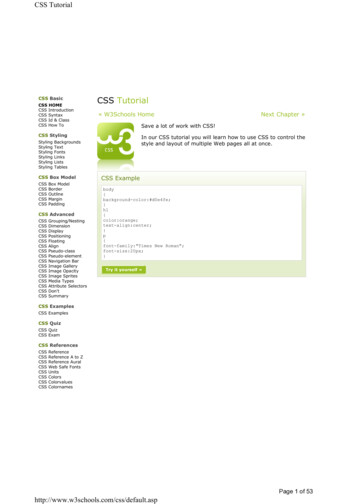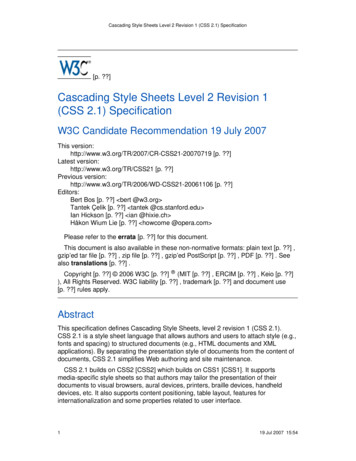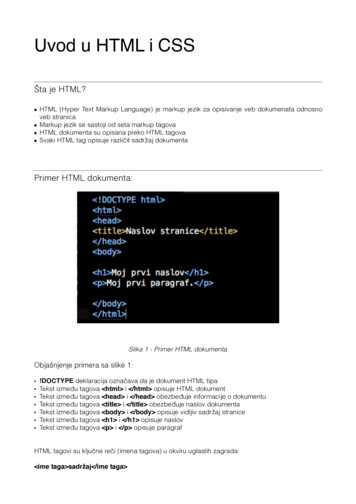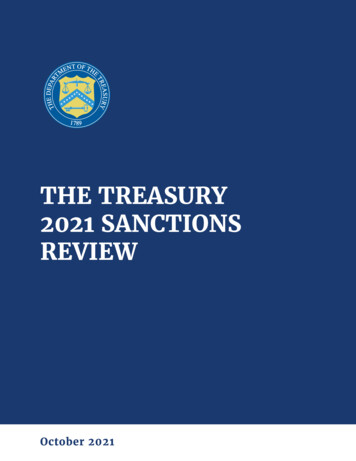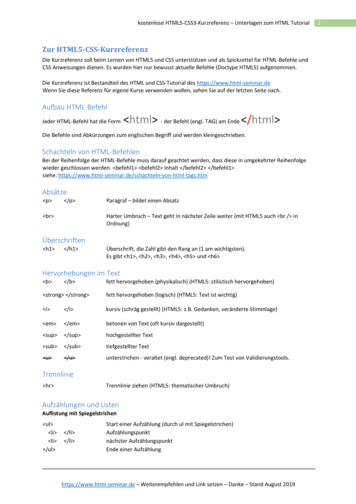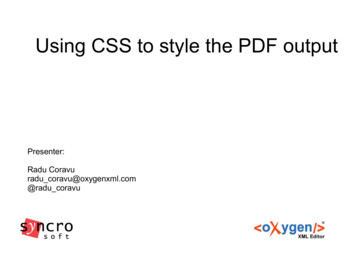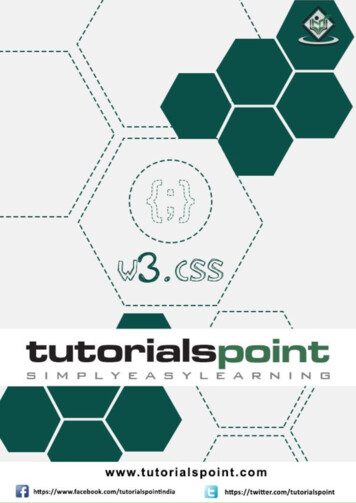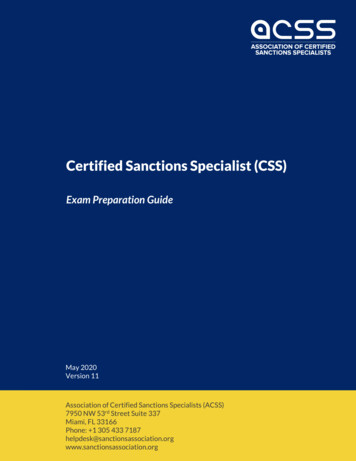
Transcription
Certified Sanctions Specialist (CSS)Certified Sanctions Specialist (CSS)Exam Preparation GuideMay 2020Version 11Association of Certified Sanctions Specialists (ACSS)7950 NW 53rd Street Suite 337Miami, FL 33166Phone: 1 305 433 association.orgwww.sanctionsassociation.org1
Certified Sanctions Specialist (CSS)Copyright 2020 by Association of Certified Sanctions Specialists(ACSS)All rights reserved. No part of this publication may be reproduced,distributed, or transmitted in any form or by any means, includingphotocopying, recording, or other electronic or mechanicalmethods, without the prior written permission of the publisher,except in the case of brief quotations embodied in critical reviewsand certain other noncommercial uses permitted by copyright law.For permission requests, write to the publisher ssociation.org2
Certified Sanctions Specialist (CSS)Table of ContentsINTRODUCTION.9About ACSS . 11SANCTIONS REGIME TYPES, GOALS, PROHIBITIONS AND EFFECTS 17Sanctions: Definitions and Objectives . 18The History of Sanctions . 19Sanctions Regimes . 20Common Types of Sanctions . 22Exceptions to Sanctions . 27Effectiveness and Unintended Consequences . 29Summary . 33Review Questions . 34SANCTIONS IMPOSERS AND TARGETS . 37Introduction . 38United Nations . 38European Union . 43United Kingdom. 59United States . 64Russia . 104Other Players in the International Arena . 104Summary . 109Review Questions . 109SANCTIONS EVASION: TYPOLOGIES AND SCHEMES . 111Introduction . 112Sanctions Evasion in the Financial Sector . 115Sanction Evasion in the Trade Sector . 122Case Study: North Korea . 125Summary . 128Review Questions . 129www.sanctionsassociation.org3
Certified Sanctions Specialist (CSS)ESSENTIAL COMPONENTS OF RISK-BASED SANCTIONSCOMPLIANCE PROGRAMS IN DIFFERENT INDUSTRY SETTINGS . 131Sanctions Compliance Programs: An Introduction . 132The Essential Components of a Sanctions Compliance System . 132Management Commitment . 144Sanctions Risk Assessment . 146Organizational Structure and Internal Controls . 149Testing and Audit . 156Training . 157Customer Due Diligence . 159Considerations for Specific Industries . 161Commercial (re) insurance . 173Exporters and importers . 185Summary . 189Review Questions . 189ROLE OF TECHNOLOGY AND LIST SCREENING . 191Sanctions Screening: An Introduction. 192The Screening Process . 193Lists and List Management . 195What to Screen? . 196Technical Issues . 199Summary . 210Review Questions . 210OPERATIONAL ISSUES CONTRIBUTING TO AN EFFECTIVE ANDEFFICIENT SANCTIONS COMPLIANCE PROGRAM . 211Operational Issues: Introduction . 212Resolving Cases . 212Licenses . 213Blocking or Freezing . 217Rejecting Transactions . 219Record Keeping and Reporting . 220www.sanctionsassociation.org4
Certified Sanctions Specialist (CSS)Contractual Clauses and Warranties . 222Interaction with Other Compliance Areas . 223The Business Environment and Sanctions. 231Summary . 232Review Questions . 233ENFORCEMENT AND (INTERNAL) INVESTIGATIONS . 235Enforcement and Internal Investigations: Introduction. 236Enforcement Agencies. 236The Investigative Process. 245Penalties . 247Internal Investigations and Voluntary Self-Disclosure . 253Summary . 255Review Questions . 256REFERENCE MATERIAL AND READING LIST . 257GLOSSARY OF SANCTIONS TERMS. 261PRACTICE QUESTIONS. 293Practice Questions for the CSS Examination . 294Answers: . 296www.sanctionsassociation.org5
Certified Sanctions Specialist (CSS)ContributionsACSS wishes to thank those who contributed to the development of the CSS andthis Study Guide.Study GuideContributing Author: Scott Nance, Langley Compliance Consulting LLCEditor: Saskia Rietbroek, CSS, Executive Director, Association of CertifiedSanctions Specialists (ACSS)www.sanctionsassociation.org6
Certified Sanctions Specialist (CSS)7Certified Sanctions Specialist (CSS) – Certification Task ForceThe following ACSS members participated in the different phases of the CSS examdevelopment process, including the Job Analysis, Item Writing and Cut ScoreWorkshops.ACSS thanks them for their support!FIRSTLASTJOB TITLEORGANIZATIONAhmedAbul-OlaSenior Officer, AntiMoney LaunderingThe National Senior ManagerClearbancMattBellSenior ManagingDirector, Global PracticeCo-Leader ExportControls and SanctionsPracticeFTI ConsultingStefanoBoezioConsultantOliver nalTylerHandChief Compliance OfficerWestern UnionGlendaJulianoSr. AML & Trade ControlAnalystInternational Global RiskControlFranklin TempletonHeidiKinkartzDirector, Global SanctionsScotiabankLeslieKuesterHead, Global SanctionsStrategyWestern UnionBSA/AML ComplianceOfficerSr. Managing ConsultantRisk & CompliancePracticeAssistant GeneralCounselSenior Expert CompliancePrograms and SystemsSolutionsGlobal Legal-Ethics &Corporate Compliance,Sr. Managerwww.sanctionsassociation.orgHome Credit U.S.IBMMoody’s CorporationRaiffeisen BankInternational AGCarnival
Certified Sanctions Specialist (CSS)FIRSTLASTJOB TITLETrade Center ofExcellence - SanctionsManagerLaw Security & PublicPolicyVice President, GlobalHead erScottNanceAlinaNedeaBenOmorogbeVP & Group GeneralCounsel LegalTravelers InsuranceFranciscoRappChief Sanctions OfficerCitiEricRudolphDirectorFTI eyCaterpillar IncState Street CorporationLangley ComplianceConsulting LLCEU CommissionGlobal Head - RegulatoryTechnologiesAML Sanctions DirectorSenior Vice PresidentEnterprise AML/BSA andSanctionsPolestarPNCUnited NationsSenior ComplianceOfficer, Sanctions andEmbargoManaging Director, Headof Sanctions &Embargoes, AmericasDanske BankDeutsche BankAtlantic CouncilDirector, CorporateComplianceSanctions ComplianceChief International TradeCounselManaging Director,Forensics & LitigationConsultingSr. Sanctions Manager Enterprise AMLFounder and FTI ConsultingBMOGreen River HollowConsulting
Certified Sanctions Specialist (CSS)INTRODUCTIONAssociation of Certified Sanctions Specialists (ACSS)7950 NW 53rd Street Suite 337Miami, FL 33166Phone: 1 305 433 association.orgwww.sanctionsassociation.org9
Certified Sanctions Specialist (CSS)INTRODUCTIONHow to Use this ACSS Examination Preparation GuideThis study guide is designed to be a companion to the “CSS Exam PreparationVirtual Classes” and a comprehensive self-paced exam preparation tool.The guide is divided into eleven primary sections to better facilitate the roductionSanctions Regime Types, Goals, Prohibitions and EffectsSanctions Imposers and TargetsSanctions Evasion: Typologies and SchemesEssential Components of a Risk-Based Sanctions Compliance Program inDifferent Industry SettingsRole of Technology and List ScreeningOther Operational IssuesEnforcement and Conducting/Supporting Investigations into SanctionsViolationsReference Material and Reading ListGlossaryPractice QuestionsThe CSS study guide uses icons to emphasize key points, definitions andinformation, to point out case studies and examples and to direct the reader to thereference section for additional information.The lightbulb can be found next to key points and definitionsThe scale and gavel indicates a case study or scenario exampleThe books direct the reader to the reference section for moreinformationThis study guide was designed to assist candidates in preparing for the CSSCertification Examination. It includes an overview of the test developmentprocess, test taking techniques and reference materials for topics included in thecontent outline for the examination. This study guide is not meant to address allpossible conditions or questions, nor does it represent a comprehensivepreparation for the examination. The editors of this examination study guide andACSS do not have knowledge of specific examination questions. While this guidewww.sanctionsassociation.org10
Certified Sanctions Specialist (CSS)11is intended to assist candidates in preparing for the examination, they areexpected to prepare for the examination through self-study.About ACSSThe Association of Certified Sanctions Specialists (ACSS) is a professionalmembership body for sanctions professionals worldwide. It was formed toadvance sanctions compliance by supporting the professional development of theindividuals who lead those efforts.The goal of ACSS is to: Serve the professional interests of its members by delivering high qualityservices and promoting the interests of the profession Provide professional qualifications and set standards for sanctionspractitioners Be an authoritative and respected voice promoting sanctions compliance Enhance the careers of sanctions professionals worldwideSee http://www.sanctionsassociation.orgAdvisory BoardGuided by an Advisory Board of distinguished experts, ACSS is dedicated toproviding its members top quality education, career development programs, andother membership benefits – including information exchange and peernetworking – to help in advancing their skills.Through professional certification and qualifications, ACSS members stand out asleaders in the field.ACSS Advisory Board Members:Clay StevensonAdvisory Board ChairFounderCHS Sanctions AdvisoryPinar Gungoren ChedruGlobal Head of Embargoes and SanctionsComplianceSociete GeneraleMatt BellSenior Managing DirectorFTI ConsultingHeidi Kinkartz B.A., LL.B., CAMSDirector Global SanctionsScotiabankMs. (Dipl. Ing.) Tatjana DobrovolnySenior Expert Compliance Programs and SystemsSolutionsRaiffeisen Bank International GroupFrancisco RappChief Compliance Officer, Sanctions and AntiBriberyCitiBrian GrantGlobal Head of Sanctions ComplianceMitsubishi UFJ Financial Group (MUFG)Robert WalshDeputy Chief Compliance Officer and GlobalFinancial Crime OfficerAXA Groupwww.sanctionsassociation.org
Certified Sanctions Specialist (CSS)Karen RobertsonGlobal Trade Compliance OfficerUber Technologies, Inc.12Robert WernerFounderGRH ConsultingJacqueline SantosSenior Vice President Enterprise Compliance BankSecrecy/Anti-Money Laundering and SanctionsPNC BankTodd WillisGlobal Trade AdvisorCaterpillar, Inc.ACSS Member Resources and TrainingWhat are the core benefits of joining the Association of Certified SanctionsSpecialists (ACSS)? As an ACSS Member, you will gain access to:CSS Certification Exam, which allows sanctions professionals the opportunity toearn credentials as a Certified Sanctions Specialist, or CSS. The credential willprovide ACSS members with a powerful career advantage and their employersand clients the comfort of knowing that he or she has met high standards ofknowledge and training. The CSS credential will test members’ skills in sanctionscompliance, export control duties, listing matching, consulting, investigating, andmore!Education and Online Certificate Programs, which provide sanctionsprofessionals to gain expertise in important sanctions topics., such as OFACEssentials, EU Restrictive Measures and Anti-Bribery Essentials.Live and On-demand Webinars, which include 25 LIVE webinars per year,where attendees can ask real-time questions during expert-led sessions and evenearn CE/CLE credits. ACSS Members also have the unique opportunity to browseour archive of on-demand webinars by logging into our online LearningManagement System (LMS).Interactive Sanctions Map, an interactive tool with an overview of sanctions inplace against countries around the world. The Map focuses on sanctions imposedby the U.S. (OFAC), E.U., U.K., U.N., and Canada. Find out what specific sanctionsare in place against a country by simply clicking on that particular country!Sanctions Enforcement Actions Database, where you can search, browse, anddownload 900 OFAC enforcement cases. The database is searchable by country,year, and industry.Official Sanctions Guidance Library, where you can find guidance provided bygovernment agencies, international institutions, and universities about how tobest implement sanctions in your country.www.sanctionsassociation.org
Certified Sanctions Specialist (CSS)Sanctions Service Providers Directory, an invaluable resource for memberslooking to contact software vendors, consultants, law firms and other providersspecializing in the sanctions field.Task Forces, where you can join up with your colleagues to shed light onimportant sanctions topics and connect with others in the sanctions community.These Task Forces are only available to ACSS Members.Online Certificate CoursesIn order to meet the need for more in-depth training on certain sanctions-relatedtopics and mitigate the risk of costly sanctions violations, ACSS developed severalonline sanctions training courses, which teaches vital principles and backgroundall sanctions compliance staff should understand.The online Certificate Courses are 7-part courses, consisting of approximately 6to 7 training hours, across 4 weeks. The courses are delivered in an online format.ACSS offers the following online Certificate Courses: OFAC Essentials EU Restrictive Measures Essentials Anti-Bribery EssentialsFor more information and updates: https://sanctionsassociation.org/certificates/CSS CertificationThe Association of Certified Sanctions Specialists offers an examination thataddresses knowledge and skills common to all sanctions professionals in variedemployment settings, including financial institutions, international corporations,law firms, consulting companies, government, and other trades and businesses.The objective of the certification program is to set the standard for the sanctionsprofession, and to make Certified Sanctions Specialists (CSS) widely recognized astrained and credentialed specialists in the sanctions field. It is a multiple-choice,proctored exam that can be taken in testing centers across the globe.Why this Certification?Career opportunities abound for the sanctions specialists, but the days are overthat just anyone can fulfil that role. Especially in these days, the “consumer” of theservices of a compliance officer or other sanctions expert has become morevigilant, demanding quality. This demand is exacerbated by the media’s constantattention to sanctions issues arising at financial institutions, or internationalbusinesses. Certification of the sanctions professional in organizations that arevulnerable to the problem is designed to meet this consumer concern.www.sanctionsassociation.org13
Certified Sanctions Specialist (CSS)Benefits of Certification PrideGrowthEmploymentFinancial RewardsReputationAchievementTesting CentersWe have partnered with a world leader in brick and mortar testing centers. Wealso offer secure online proctoring.CLOSE TO YOUOver 5,100 test centers in over 190 countries. Located at over 2,560 differentcities.FLEXIBILITYA scheduling portal finds the center nearest to you and helps you schedule thedate and time of the test.COMMUNICATIONGet support, reminders, and directions to the test center.HELPOur testing centers are started with personnel that will guide through theidentification process and testing protocols.What is on the exam?The exam will focus on various aspects of the sanctions subject. A job analysis willdetermine the content and the importance of each knowledge area for thespecialists in the field. The certification exam will be tailored to international bestpractices and basic frameworks for sanctions efforts around the world.I.II.III.IV.V.Sanctions Regime Types, Goals, Prohibitions and EffectsSanctions Imposers and TargetsSanctions Evasion: Typologies and SchemesEssential Components of a Risk-Based Sanctions Compliance Program inDifferent Industry SettingsRole of Technology and List Screeningwww.sanctionsassociation.org14
Certified Sanctions Specialist (CSS)VI.VII.Other Operational Issues Contributing to an Effective and EfficientSanctions Compliance ProgramEnforcement and Conducting or Supporting Investigations intoSanctions ViolationsAdministration of the examSince ACSS members reside worldwide, ACSS uses a computerized exam. ACSSoffers the exam throughout the year in brick and mortar testing centers, plusthrough online proctoring. Requirements to sit for the exam include thecompletion of an ACSS exam application and payment of an application fee. Formore information see here: https://sanctionsassociation.org/css-process/.Who can take the exam?ACSS Certification eligibility is based on a points system. Candidates who wish totake the CSS Examination must have a minimum of 40 qualifying credits based oneducation, other professional certification, and professional experience in thesanctions field (see below), in addition to providing 3 references.Further, you must be an active member of ACSS in order to sit for the exam.Point system:I.Education:a. Associate Degree: 10 creditsb. Bachelor’s Degree: 20 creditsc. Master’s Degree/PhD/JD or equivalent: 30 creditsII.Professional experience:a. Each year of full-time experience in sanctions or related duties.b. Professional experience is limited to 3 years: 10 credits per yearIII.Training:a. Professional Certification – CPA, CPP, CRCM, CAFP, CFE, CAMS,CGSS, ETCI ECoP, Finra Series, etc: 10 credits per certification.b. Attendance at a course / seminar / webinar / conference / training/ certificate courses or educational session on the topic ofsanctions, trade compliance or export controls or related subjects(includes internal training, external training, government agencytraining) – 1 credit per hour.For more information, visit: ciation.org15
Certified Sanctions Specialist (CSS)www.sanctionsassociation.org16
Certified Sanctions Specialist (CSS)SANCTIONS REGIME TYPES,GOALS, PROHIBITIONS ANDEFFECTSAssociation of Certified Sanctions Specialists (ACSS)7950 NW 53rd Street Suite 337Miami, FL 33166Phone: 1 305 433 association.orgwww.sanctionsassociation.org17
Certified Sanctions Specialist (CSS)Sanctions: Definitions and Objectives“{W}e must develop alternatives to violence that are tough enough to actually changebehavior — for if we want a lasting peace, then the words of the international communitymust mean something. Those regimes that break the rules must be held accountable.Sanctions must exact a real price. Intransigence must be met with increased pressure —and such pressure exists only when the world stands together as one.”Barack Obama (Nobel Peace Prize Acceptance Speech, Oslo, 9 December 2009)What Are Sanctions?Sanctions are financial, physical, and other measures taken to prevent certaintypes of activities or to influence the behavior of countries, groups, or individuals.Economic sanctions have traditionally been defined as the “deliberate,government-inspired withdrawal, or threat of withdrawal, of customary trade andfinancial relations with a target country in an effort to change that country’spolicies.” 1 In other words, economic sanctions are legal measures that typicallyrestrict or prohibit trade and financial transactions with specified targets.Sanctions may also allow certain types of behavior, such as investment in asanctioned country, but require that it be reported. A key point is that sanctionsare legal measures; they have the force of law, and failure to comply with them cangive rise to potentially severe penalties.One important aspect of economic sanctions is that they are to a large extent selfenforced, as their effectiveness depends primarily on voluntary compliance. Inthis way they differ from military measures, such as naval blockades. Sanctions arealso different from other trade measures, although they may shade into oneanother. The imposition of import or export duties or quotas, for example, are notgenerally considered to be economic sanctions. In general, economic sanctionsare used to accomplish political rather than economic goals, although thedifference between the two can be subtle.Throughout this guide, the country imposing sanctions is identified as thesanctioning country. The country that is the target of the sanctions is referred toas the target country.Sanctions ObjectivesSanctions may have several different objectives. These include: To deny resources to the target, with the aim of making certain activities,such as terrorism or narcotics trafficking, impossible; To persuade or compel the target to change its practices1Gary Hufbauer & Barbara Oegg, A Short Survey of Economic Sanctions, INST. FOR INT’L ECON.(Aug. 2001), onsassociation.org18
Certified Sanctions Specialist (CSS) To penalize the target for its practices To make a symbolic political statement, either to domestic politicalconstituencies or to the global community as a wholeThese are largely political goals, and the imposition and administration ofsanctions is inherently political. This means that sanctions can change, often quiterapidly, in response to political events. There is a tend
Certified Sanctions Specialist (CSS) 1 www.sanctionsassociation.org . May 2020 . Version 11 Certified Sanctions Specialist (CSS) Exam Preparation Guide . Association of Certified Sanctions Specialists (ACSS) 7950 NW 53. rd. Street Suite 337 . Miami, FL 33166 . Phone: 1 305 433 7187 . helpdesk@sanctionsassociation.org . www.sanctionsassociation.org
